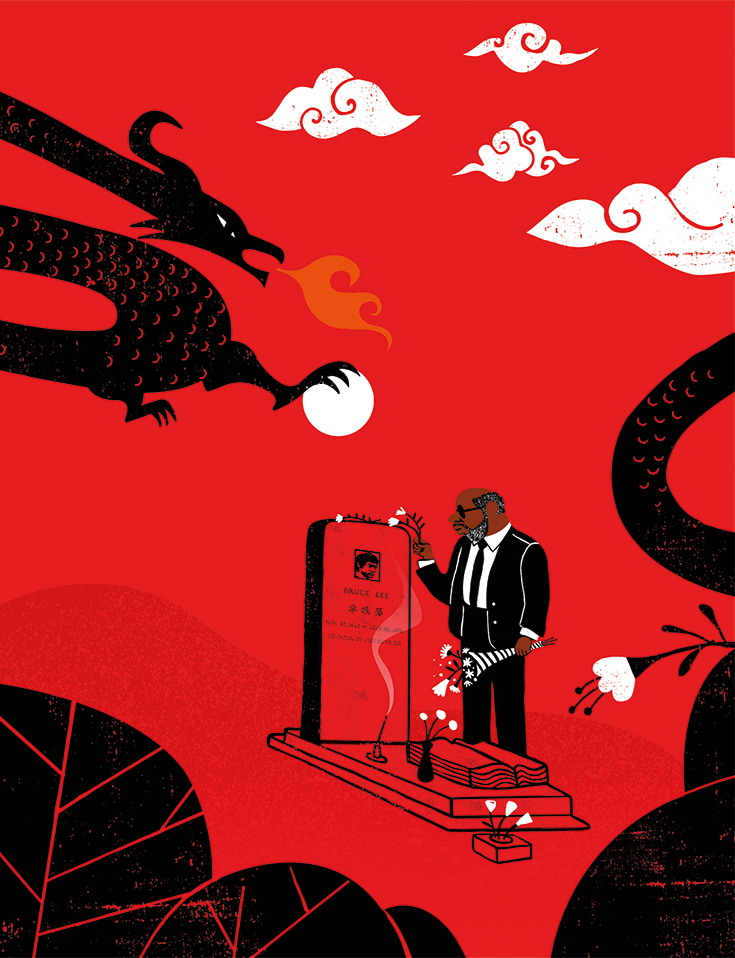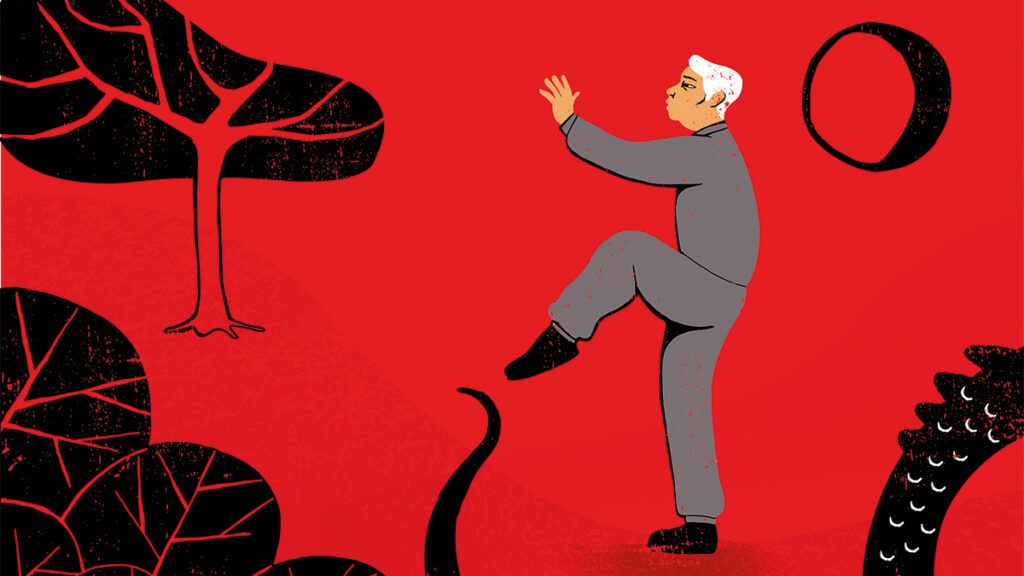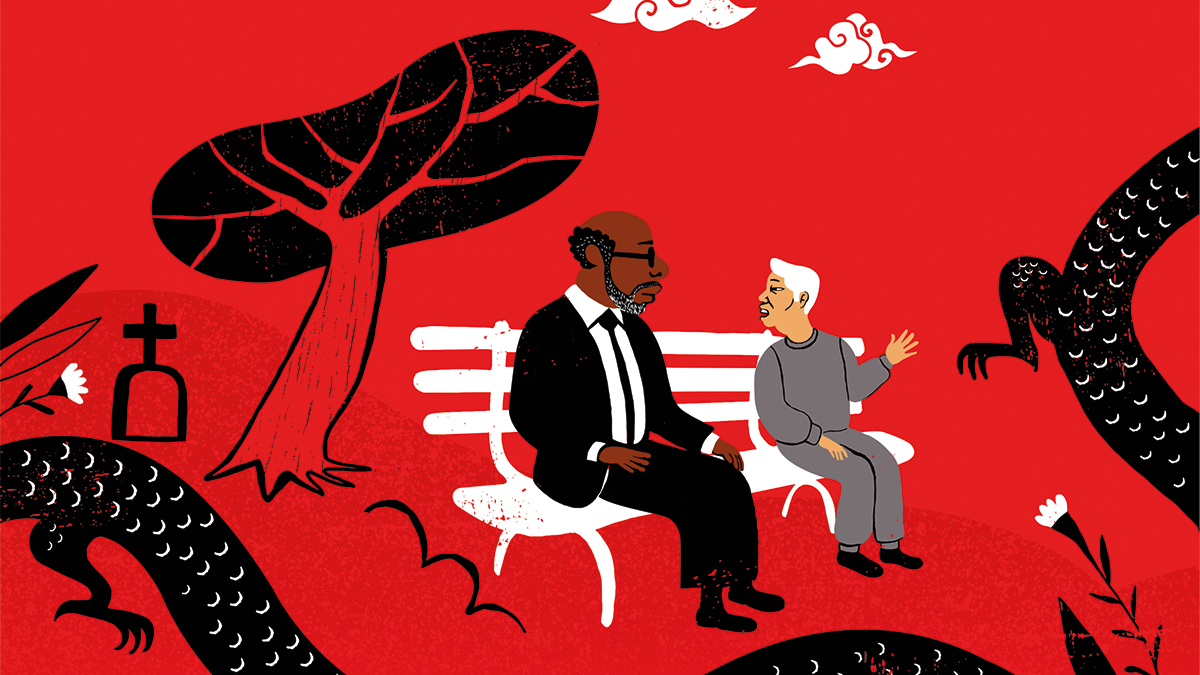For decades pilgrims from around the world have flocked to Lake View Cemetery on Capitol Hill in Seattle. Tens of thousands arrive every year to pay their respects to Bruce Lee, an international celebrity from Hong Kong, whom Time magazine listed as one of the one hundred most important people of the twentieth century. This is one of the ten most visited gravesites in the world.
Like many martial artists, you especially want to pay your respects at Bruce’s final resting place on the fiftieth anniversary of his death in 2023. It’s on a late afternoon that you, not too clear in your head and heart, go to his gravestone.
Lakeview Cemetery has few trees and even less shade. The sun, a raging ball of gas and plasma, is blinding, so you’re wearing a pair of polarized Ray-Bans. To reach where Bruce is buried, you walk straight from the front gate. His and his son Brandon’s graves are cordoned off, which means you must pad along a paved walkway.
On the headstone, there is a black-and-white photo of Bruce, forever thirty-two years old. It was he who revolutionized fight scenes in American movies and shattered stereotypes by projecting the image of an Asian man who was unbeatable, handsome, young, and sexy. His name appears in English and Chinese, and beneath that are the words “Founder of Jeet Kune Do.” At the foot of his grave there’s an open book made of stone, which is as black as anthracite or onyx. On its left page is a yin and yang symbol.
You’re short-winded when you get to the grave. At age seventy-five, you’re still in good health, according to your doctor, but certainly not young, handsome, or sexy, if you ever were. You no longer feel like yourself. Your old athletic self. Something feels a little off-balance, a little wrong. And your training regime has become spotty, less rigorous, lacking something, though you don’t know what. After a lifetime of throwing millions of kicks and split-second punches that were faster than thought and drilled into muscle memory, you now sometimes wake up wondering what part of your anatomy will be acting up or aching next. Sometimes after a workout you need to soak your knees in ice and take an Advil.
There is another pilgrim ahead of you, an Asian man, who before your encounter ends today will tell you a horror story and show you something you didn’t know you needed to see. He is seated in a wedge of sunlight on a stone bench a few steps from the gravesite, wearing a pewter-grey sweatshirt and sweatpants. You place this visitor’s age at eighty. Maybe eighty-five. And you guess he’s probably five foot seven and no more than one hundred and forty pounds—much like the man whose burial place you’re visiting. Briefly, without staring, you notice his well-barbered, salt-white hair, bony wrists, and how he carries himself with a quiet dignity, at ease in his body and apparently with everything happening around you. There is elegance and economy in the way he draws from his sweatpants a gold watch that hangs like a drop of liquid suspended on a chain.
You can feel him giving you a going-over, sizing you up as you place a bouquet of flowers, one of many, at the grave. Soon you will see he is the door, and you a man who’s lost the key/ki. He continues watching as you light a lavender stick of incense and say a prayer for the happiness and safety of everyone in Bruce’s family as well as for all sentient beings.

When you’re done, this other pilgrim says in a voice a little too loud, as if he might be losing his hearing, “Excuse me. My name is David Choi. Are you Buddhist?”
“Yes, sir. Soto Zen.”
“What brings you here? Did you study with Bruce Lee?”
You take off your Ray-Bans. “No, sir, I didn’t know him personally, but I did study briefly with some of his students. John Beall taught me some Wing Chun at his school on Green Lake. He was taught by James DeMile, who was taught by Bruce. DeMile taught me a technique for meditation that I still use.”
Mr. Choi recognizes each of those Seattleites little known outside the martial arts world. He nods, lowering his eyelids. “Yes, I knew them all. I once taught what I learned from them.” Lifting his gaze, he looks straight ahead at Bruce’s headstone. “I miss them. There are a lot of things I don’t understand and miss these days, like my wife who closed her eyes this year.” Suddenly, Mr. Choi tilts his head and squints at you. “How long have you been practicing?”
You leave a silence, not wanting to answer, perhaps because you haven’t been practicing enough lately. Also, you just don’t like telling people how long you’ve been studying how to fight. They might misunderstand. You hate the ugly stereotype of Black men being violent and something to fear. They might not see that you just train for self-defense and to protect yourself and your loved ones. You could tell Mr. Choi you’ve been practicing martial arts since you were nineteen. You competed in tournaments. And if all of those years of training have taught you anything, it is humility. A fighter knows there’s always someone—somewhere—who can beat him. And that your real opponent over five decades has always been, and only been, and can ever only be yourself. Your ego.
But what you say to Mr. Choi is: “Since my teens in 1967. There was a lot of violence in that decade when I was young. Because of the Civil Rights Movement. I grew up in a culture of daily violence in one form or another, physical or verbal.”
Instantly, at your mention of violence, his body stiffens, but his left hand pats the stone bench. “Here, come sit,” he says, his forehead knotted. “There’s as much violence today as then, don’t you think? Maybe more. Crazy violence.”
“Yes, I know.”
Even as you say this, you both can hear the scream of police sirens on wind swirling through the hot, dry cemetery, shaking and shattering the air. Lately, it is a sound you can hear every day in what used to be called America’s most livable city. It pains you to think about how public places no longer seem safe from weekly, even daily, shootings and stabbings. Not college campuses or elementary schools. Not theaters, supermarkets, malls, dance halls, churches, or synagogues.

The way you’ve trained in Asian martial arts—with traditional weapons like a staff or a broadsword—seems useless against AR15s and other military assault weapons proliferating from coast to coast. You’ve read that the lives of one out of five Americans have been touched by gun violence. Everyone knows this, everyone sees it, everyone feels helpless to end it. Even thinking about this triggers imagined scenarios of conflict and competition, winning and losing, in your mind. And you know that isn’t healthy.
Mr. Choi lays his hands on his lap and for a moment is quiet. In his eyes there is a troubled look. You have the feeling he wants, needs to talk to someone. To another practitioner.
“Do you still do martial arts?” he asks. “Do you think it’s worth it? All that training and trying to improve—for what?”
“Yes,” you say, “I try. Do you?”
“Sometimes.” A sudden hardness creeps into his eyes. “I’m eighty-nine. I live at Ida Culver House. I’ve had a right hip replacement, and I’m wearing two hearing aids. I practice Yang style Tai Chi Chuan in the morning when my back isn’t bothering me. But I won’t teach anymore. I can’t. Not unless I find a good student. Real Tai Chi is a dying art. There are only a few true teachers in this world, and most only show the application of fighting moves to members of their family or their favorite disciples. Not many young people today want to be disciples, to devote the time to something as demanding as this, or to maybe any form of art. They think, why bother, I can just buy a gun.” And then he says something you don’t see coming until it arrives.
“That’s how I lost my granddaughter.”
You wince, uncertain how to reply.
“I loved her beyond measure,” he says. “This watch was a gift from her on my eightieth birthday. She knew that I love watches and collect them. There’s something wonderful in the way science and art come together in a well-made watch. You can wear the mystery and wonder of time right on your wrist. She took me and my wife to Umi Sake House in Belltown. She knew I liked their sushi. We talked about her studies, her friends, and dined until nine. When we walked back to her car, a young man came up to us and asked if we could help him because he was homeless and hungry. My granddaughter always had a good heart. She reached into her purse. He grabbed it. She wouldn’t let go, so he hit her. He shoved her onto the sidewalk. My wife started screaming…”
You feel a knot gathering in your throat. “Did you try to stop him?”
“Oh, yes.” His voice begins to creak and wheeze. “I gave him the worst thirty seconds of his life. He couldn’t fight. He was out of shape, maybe on drugs. I got inside his guard. That was easy. He threw a sloppy roundhouse punch. I blocked that with the move called parting the wild horse’s mane, broke his arm with the move called play the fiddle, and swept his feet out from under him.”
“So, you won, right?”
“No, wrong. He had a gun and fired five times, striking me twice and ending my granddaughter’s life. It took me weeks to stop shaking. It took longer to heal, if that ever happened. I tried to protect her. I failed. The world was too much for me. I always think I should have been faster. I needed to be younger.”
“Sir, I don’t believe you failed….”
You know it will be disrespectful to say any more. Anything you say will be too little or too much. And too late. So instead, you listen as he talks about that terrible night nine years ago. About his training. Day dissolves into night with a quarter moon like a clipped toenail hanging over the cemetery, the air no longer hot, only lukewarm now. And you can’t help but wonder about something. You say, “Play the fiddle? That was the technique you used?”
“Yes, do you know how to use it?”
“I’m not sure.”
“Then I can show you.”
Mr. Choi stands and steps away from the stone bench. He begins the Yang style Tai Chi form he practices every morning. It only has twenty-four moves. You’ve done this set thousands of times and thought you knew it until he begins dancing in the moonlight, releasing the form that lives inside him, the energy of his pain alchemized into kinesis.
In the next few fibrous seconds, you see meditation in motion. A tissue of history and culture and tradition contained in just two dozen moves. Some of them yin, some yang. Movement guides his in-and-out wind. Like a man under water, like someone in a different dimension of time, each of his postures flows from the last with a fluidity, a grace that only a lifetime of practice can purchase. Never flat on both feet, never stopping any more than a stream can stop, his weight is always perfectly balanced with eighty percent on one leg, twenty on the other. His visible movements, his technique and ki, make present the invisible—the influence of his teachers. They come alive in the subtleties and intricacies of his every gesture. It is as if Mr. Choi, the man you’ve been talking to for hours, the man who lost his granddaughter in a senseless act of violence, has disappeared, fallen away along with the dark hole left by her death, leaving only this seemingly weightless figure floating through each move like a spirit spun from the finest air, creating a brief moment of beauty and order in a world awash in chaos.
The form takes all of three minutes. It ends with his bow to all present and to the ancestors. You feel the stillness doing this performance has awakened in Mr. Choi. You feel that now in yourself. He turns your way and says, “You see?”
You do. “Wish I could do it that way, but I guess you can’t teach an old dog new tricks.”
“Never too old,” he says. The corners of his eyes crinkle as he smiles. “Maybe someday soon I show you how.”
